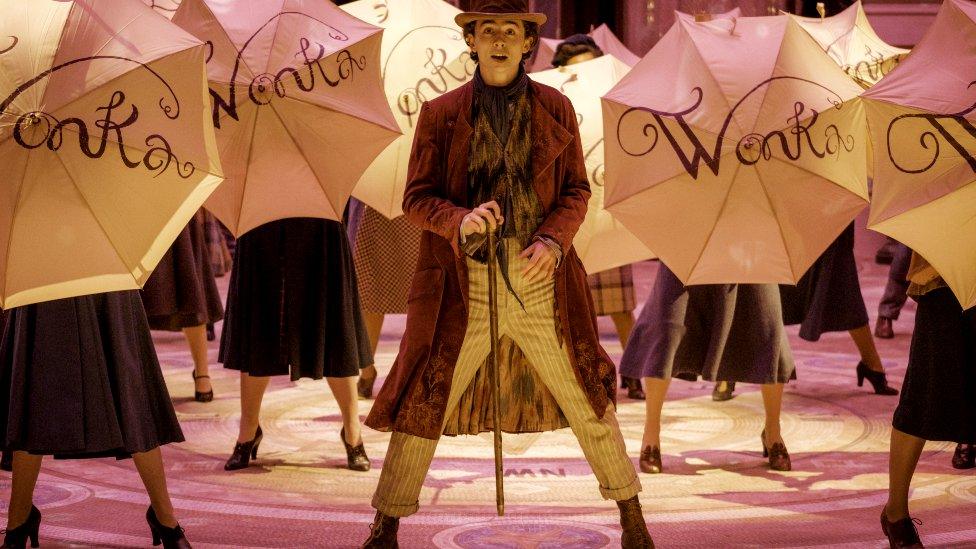Can boomers decipher zoomer slang?

Students (from left) Olivia, Alex, Lauren, Cara, Georgia and Harlie
- Published
Do you know what the words delulu and cheugy mean, or do they sound like gobbledegook?
The gap between the TikTok generation and the baby boomers could be described as "whacking", meaning older folk do not have the faintest idea what is going on.
Slang has provided an alternate means of communication for years – and the zoomers certainly did not invent it.
But for those struggling to keep up, we met Wilberforce College students at the Northern Academy of Performing Arts (Napa), in Hull, to get the lowdown on the latest buzz words – before heading to the city's indoor market to test them out on boomers.
One of the terms up for discussion is "brain rot" – which the Oxford English Dictionary describes as "a perceived loss of intelligence or critical thinking skills... as attributed to the overconsumption of unchallenging or inane content or material."
"You might see it on TikTok – [things like] people filling their mouths with water and spitting it out while trying not to laugh," says Napa student Harlie.
Slang words in common use a few decades ago, such as "sick" – meaning cool or impressive – have also been changed for a new generation.
According to fellow student Georgia, the modern equivalent today is probably "slay" – meaning cool.
"Clock it" is another phrase that might feel familiar, but for the zoomers, it means something quite different.
"If I prove a point, or someone else proves a point, I would say 'clock it', while doing the appropriate finger motion," says Olivia.

Teacher David Green says young people can develop a subversive form of language
When Napa teacher Andrew Siddle becomes involved in the conversation, one student tells him: "You're so funny, please don't go bald."
"It's too late," he replies. "What does that mean?"
The answer – "not funny".
Words including "skibidi" (sometimes used in place of "cool" or "bad"), "tradwife" (traditional wife) and other slang terms popularised on social media were among thousands of new words to be added to the Cambridge Dictionary this year.
David Green, who teaches A-level English at Wilberforce College, says language has been evolving for centuries, with young people using words and phrases that best reflect how they feel, and to show they belong as part of their particular youth culture group.
Are they hiding rude words in the language they use?
"They could well be," says David. "But not just rude words, but almost like a secret, subversive language that is somehow rebellious against the authoritarian figures in front of them.
"People like me – teachers, or parents," he adds.
To keep up, he says it is necessary to engage and to ask why a particular word, or phrase, is being used.

Ted Marshall describes himself as a child of the 50s
Down at Trinity Market, Ted Marshall, who describes himself as a child of the 50s, attempts to define "delulu".
"It sounds like someone who needs the toilet," he jokes.
According to those in the know, it actually means delusional.
Ted suggests "gucci", which means cool, might be something you get up to behind the garages – at least back in the days of his youth.
"Cheugy", on the other hand, describes someone or something considered out of date or uncool.
Another visitor, Alex Scurr, guesses "rizz" might mean chewing gum. It is actually slang for "charisma".
Meanwhile, Derek Thornton and his wife Chris have a go at defining "spill the tea".
Derek says: "I do anyway – I wobble a bit at my age."
However, Chris correctly deciphers it as "to spill the beans", or tell a secret.
So, how about "baddie"?
"Bad person?" asks Derek. Well, not if you use it to describe your wife. It means she is a "babe".
"You've never called me babe," jokes Chris.
Listen to highlights from Hull and East Yorkshire on BBC Sounds, watch the latest episode of Look North or tell us about a story you think we should be covering here, external.
Download the BBC News app from the App Store, external for iPhone and iPad or Google Play, external for Android devices
Related topics
- Published18 August

- Published1 September

- Published8 December 2023
